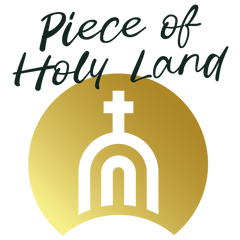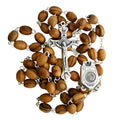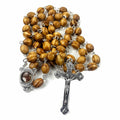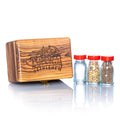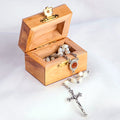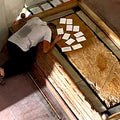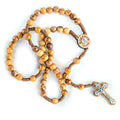The Role of Christianity in Protecting Olive Trees in the Holy Land
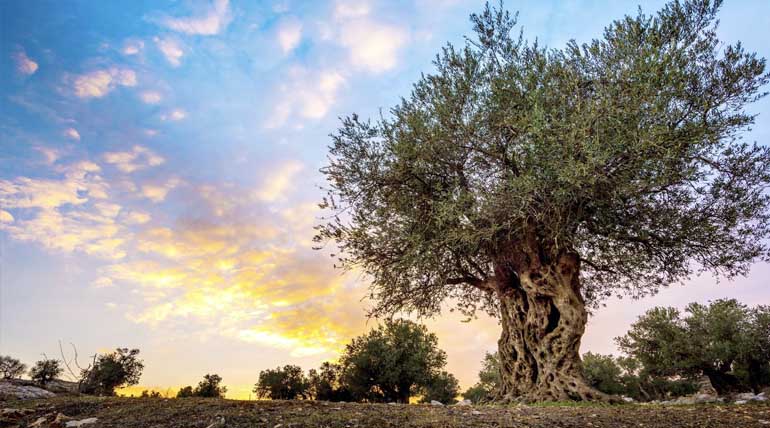
Faith, Sustainability, and the Sacred Symbolism of the Olive Tree in the Holy Land
The Sacred Symbolism of the Olive Tree in Christianity
The olive tree holds deep significance in Christianity, appearing throughout the Bible as a symbol of peace, divine blessing, and spiritual endurance. The very wood of these trees has been transformed into sacred objects, such as olive wood rosaries and olive wood crosses, carrying the message of faith into homes around the world. From the story of Noah’s ark to Jesus’ prayers in the Garden of Gethsemane, olive trees have been closely tied to pivotal moments in the faith.
In Genesis 8:11, a dove returns to Noah with an olive leaf, signaling the end of the flood and the restoration of life on Earth. This imagery has endured as a symbol of reconciliation between God and humanity. Similarly, in Romans 11, Paul uses the olive tree to illustrate the relationship between Jews and Gentiles, emphasizing spiritual unity.
Moreover, Jesus spent His final hours in prayer among olive trees at the Garden of Gethsemane, reinforcing their association with endurance, sacrifice, and faith. The deep-rooted nature of the olive tree, which allows it to thrive even in harsh conditions, reflects the resilience of faith and the eternal nature of God's promises.
Biblical Teachings on Nature Conservation
Christian teachings often emphasize the responsibility of humans to care for God’s creation. In Genesis 2:15, Adam is placed in the Garden of Eden "to work it and take care of it," establishing a divine command for environmental stewardship. This duty extends to all of creation, including the olive trees that have flourished in the Holy Land for thousands of years.
Pope Francis’ Laudato Si’ encyclical highlights the Christian obligation to protect the environment, reminding believers that caring for nature is an extension of faith. Many faithful choose olive wood rosaries as a reminder of this connection between spirituality and nature, blending devotion with eco-conscious choices. Many churches and Christian communities around the world have adopted eco-friendly practices, reinforcing the biblical call to sustainability.
The Struggle to Protect Ancient Olive Groves in the Holy Land
Despite their resilience, olive trees in the Holy Land face growing threats from urban expansion, climate change, and regional conflicts. These trees, some of which are over a thousand years old, are not only important to the local economy but also carry immense historical and spiritual significance.
Palestinian and Israeli farmers, many of whom are Christians, have dedicated themselves to preserving these trees despite increasing challenges. Their dedication ensures that sacred artifacts such as olive wood crosses continue to be crafted in ways that honor both faith and sustainability. In regions such as Bethlehem, Nazareth, and Jerusalem, olive trees are an integral part of Christian heritage, deeply connected to biblical history.
Organizations and churches in the Holy Land actively work to protect olive groves, emphasizing that these trees are not just agricultural resources but sacred reminders of faith. Supporting these farmers through ethical trade and sustainable practices ensures that this rich heritage is preserved for future generations.
Sustainable Use of Olive Wood in Christian Artisanship
One of the most meaningful ways to protect olive trees is through sustainable harvesting practices. Skilled artisans in Bethlehem and surrounding areas craft religious items from olive wood, using branches that have naturally fallen or been pruned rather than cutting down entire trees. This method ensures the long-term health of the olive groves while allowing artisans to continue their centuries-old craft.
Olive wood carvings have been a staple of Holy Land Christian artistry for generations, creating religious items such as:
-
Olive wood crosses – A symbol of devotion, handcrafted from sustainably sourced wood that carries biblical significance.
-
Olive wood rosaries – A meaningful devotional tool crafted from the very trees that have stood witness to biblical history.
-
Olive Wood Cross with Mother of Pearl – A beautifully handcrafted cross combining the natural elegance of olive wood with the luminous touch of mother of pearl, sustainably sourced from the Holy Land.
-
Christian gifts made from olive wood – Thoughtful handcrafted items that celebrate faith, including crosses, rosaries, and decorative pieces from the Holy Land.
By purchasing these ethically made products, Christians worldwide can support sustainable practices and help protect the olive trees that hold such a central place in the faith.
Reflection and Takeaway: A Call to Faithful Stewardship
The olive tree is more than just a plant—it is a living testament to faith, resilience, and divine provision. As Christians, caring for these sacred trees aligns with the biblical call to stewardship and sustainability. By supporting sustainable olive wood artisans and advocating for the protection of ancient groves, believers can take an active role in preserving both the spiritual and environmental heritage of the Holy Land.
Explore our collection of handcrafted olive wood crosses, olive wood rosaries, and other Christian Gifts, and bring home a piece of Christian history that supports faith-based sustainability efforts.
SHARE:

